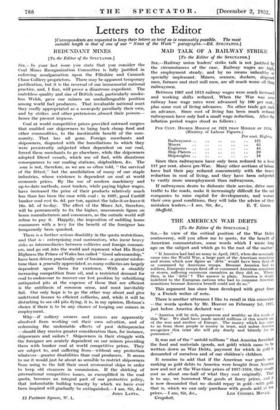THE AMERICAN WAR DEBTS [To the .Editor of the SPECTATOR.]
SIR,—In view of the critical position of the War Debts controversy, will you allow me to quote, for the benefit of American commentators, some words which I wrote long ago on the subject and which go to the root of the matter?
" If America had had an army in April, 1917, when she nominally came into the World War, a large part of the American munitions and stores which now figure as ' debt ' would have been fired off or consumed by American troops. Because America had no soldiers, European troops fired off or consumed American munitions or stores, suffering enormous casualties as they did so. Where, then, is the ' debt' ? The answer is plain. America is deeply indebted to the European nations who had to consume American munitions because America herself could not do so."
This argument has since been developed with great force by a French writer of note.
- There is another utterance I like to recall in this connexion —the words spoken by Mr. Hoover on February 1st, 1917, just before America declared war : " America will be rich, prosperous and wealthy as the result of this War. We shall have made untold millions of this wealth out of the woe and swelter of Europe. The money which has come to us from these people' is money in trust, and unless America recognizes this trust .she will pay dearly and bitterly for its possession."
It, was out of the ." untold millions " that America furnished the food and materials (goods, not gold) which came to be written down as War Debts, payment for which in gold is demanded of ourselves and of our . children's children.
It remains to add that if the American war goods now ranking as gold debts to America were bought from America now and not at the War-time prices of 1917-1918, they would cost us about one-half of what they cost originally. That is to say, we borrowed War goods at fancy prices, and it is now demanded that we should • repay in gold—with gold, that is, which we can only' purchase with goods sold at low prices.—I am, Sir, &c.,










































 Previous page
Previous page